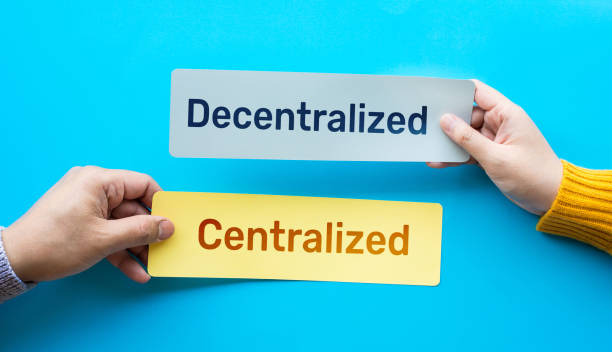
Decentralized finance is gradually gaining traction as a more secure, transparent, and efficient alternative to traditional banking. We establish a more transparent and trustworthy financial system that is also considerably more accessible by eliminating the need for centralized financial institutions.
Decentralized finance (DeFi), which is secured by blockchain technology, is supposed to lower the dangers of fraud, corruption, and misuse of your assets. It also makes handling finances significantly more cost-effective and efficient, as there are no overdraft penalties, no wire transfer fees, and no need to wait for a transaction to be processed during banking hours.
We shall compare the two systems in this blog. To comprehend the relative advantages and disadvantages of CeFi and DeFi, we must first comprehend these two ideas.
What is Centralized Finance (CeFi)?
Prior to the introduction of DeFi, the standard for trading cryptos was Centralized Finance. It controls a significant portion of the cryptocurrency market. All crypto trade orders are processed by a central exchange in centralized finance (CeFi). The central exchange is administered by specific individuals who manage the funds. It means you don’t have access to your wallet since you don’t have a private key. Furthermore, the exchange determines which coins are available for trading and how much you must pay in fees to trade with them.
To summarise the concept of centralized finance, when you purchase or sell cryptocurrencies through a centralized exchange, you do not own them. Also, you are bound by the rules imposed by a centralized exchange. However, decentralized finance is catching up, with DeFi’s yield farming trend witnessing incredible growth this year.
Read: All You Need To Know About Cryptocurrency
What is Decentralized Finance (DeFi)?
There is no involvement of exchange in decentralized finance. The entire procedure is controlled by automated programmes developed on blockchain platforms. Decentralized finance also aims to create an equitable financial system in which everyone can participate. Even unbanked people should be able to use blockchain technology and DeFi to have access to banking services.
Decentralized finance, in particular, aspires to build a permissionless, open-source, and transparent financial services ecosystem. Crypto lending, borrowing, yield farming, asset storage, and other services are available through this decentralized financial system. The capacity to maintain control over your assets is the main advantage of decentralized finance over centralized finance. This means you own the wallet’s key pair and are the only one who can move your money. Furthermore, users who wish to engage in DeFi must do so using decentralized applications (DApps) created on top of blockchain platforms.
How is DeFi different from CeFi?
Users that utilise DeFi have faith in the technology’s ability to carry out the services that are being offered. Users of CeFi, on the other hand, trust a company’s employees to manage finances and provide services.
DeFi and CeFi both offer a variety of cryptocurrency-related financial services. Let’s take a look at some of the characteristics and functions of both ecosystems that set them apart.
Features of Centralized Finance
Centralized Exchange (CEX)
Users submit funds to a standard cryptocurrency exchange, such as Binance, Kraken, or Coinbase, and the exchange manages them in an internal account. Despite the fact that money is housed on the exchange, they are kept outside of users’ control and are exposed to threats if the exchange’s security procedures fail.
As a result, centralized exchanges have been targeted by a variety of security attacks. Customers on centralized exchanges are comfortable revealing personal information and placing funds in the custody of these organisations because they believe central exchanges are trustworthy. Furthermore, large exchanges have entire departments with customer support staff available to assist customers. The excellent quality of customer service gives customers a sense of security, reassuring them that their finances are in good hands.
Cross-chain services
Trading of LTC, XRP, BTC, and other coins issued on separate blockchain systems is supported through CeFi services. DeFi services do not support these coins due to the latency and complexity of completing cross-chain exchanges. CeFi can solve this problem by obtaining custody of funds from several blockchains. Many of the most often traded and highest-market-cap coins exist on separate blockchains and do not follow interoperability standards, therefore this is a huge benefit for CeFi.
The Flexibility of Fiat Conversion
When converting cash to bitcoin and vice versa, centralized services offer more flexibility than decentralized services. Converting bitcoin to fiat normally necessitates the use of a centralized institution; nevertheless, DeFi services do not provide as much flexibility as fiat. Customer onboarding in the Centralized Finance (CeFi) ecosystem is simple and can improve the customer experience.
Features of Decentralized Finance
Permissionless
To use DeFi, users do not need permission. To utilise CeFi’s services, consumers must first undergo a KYC process, which requires them to give personal information or make a financial deposit.
Users can use a wallet to access the services without having to provide personal information or deposit money with DeFi. It’s because DeFi is open to everyone, without any restrictions or discrimination.
Individuals who want to build on top of a decentralized platform can do so without restriction. It offers a high level of accessibility and encourages community collaboration. The products developed as part of the DeFi ecosystem are meant to complement one another. As a result, DeFi devices are frequently referred to as money legos.
Innovative Tech Solutions, Tailored for You
Our leading tech firm crafts custom software, web & mobile apps, designed with your unique needs in mind. Elevate your business with cutting-edge solutions no one else can offer.
Start NowTrustless
The biggest advantage of using DeFi services is that you don’t have to trust that they’ll work as advertised. Users can verify that DeFi services work as expected by auditing their code and utilising external tools like Etherscan to see if a transaction was completed appropriately.
Quick Innovation
Another notable benefit of DeFi is its rapid rate of innovation. The Decentralized Finance Ecosystem is constantly improving existing capabilities while also experimenting with new ones. The DeFi space has evolved from a build-centric environment to a diverse ecosystem with ground-breaking financial services. DeFi space has been working to give alternate approaches to handle the issue in functionalities where centralized financial services have developed. To solve DeFi’s incapacity to support the transfer of incompatible cryptocurrencies like BTC, solutions like tBTC and WBTC, which are compatible with decentralized protocols, bridge the gap by acting as tokens pegged to the value of BTC. It allows DeFi users to utilise DeFi to access Bitcoin without having to use the token directly.
What’s best: CeFi or DeFi?
Both centralized and decentralized finance seek to accomplish the same goal. They want to popularise cryptocurrency trading and increase trading volume. However, the manner in which these two achieve their goals differs.
CeFi works by establishing trust along the way. It guarantees the safety of funds and the fair trading of those funds. It also has a wider range of fiat-crypto-fiat conversions. Crypto trading is also available to investors who possess traditional currencies. Furthermore, CeFi exchanges provide them with customer care, which is typically lacking with DeFi services. DeFi, on the other hand, aims to keep the space free of encroachment. It gives investors a place to put their strategy into action without having to deal with a middleman.
Both methods have advantages and disadvantages. It is dependent on the investor’s priorities. If privacy and openness are important to you, DeFi is the way to go. If you’re concerned about trust, risk sharing, additional investment possibilities, and flexibility, CeFi is the way to go.
Before you go…
Hey, thank you for reading this blog to the end. I hope it was helpful. Let me tell you a little bit about Nicholas Idoko Technologies. We help businesses and companies build an online presence by developing web, mobile, desktop and blockchain applications.
As a company, we work with your budget in developing your ideas and projects beautifully and elegantly as well as participate in the growth of your business. We do a lot of freelance work in various sectors such as blockchain, booking, e-commerce, education, online games, voting and payments. Our ability to provide the needed resources to help clients develop their software packages for their targeted audience on schedule is unmatched.
Be sure to contact us if you need our services! We are readily available.










